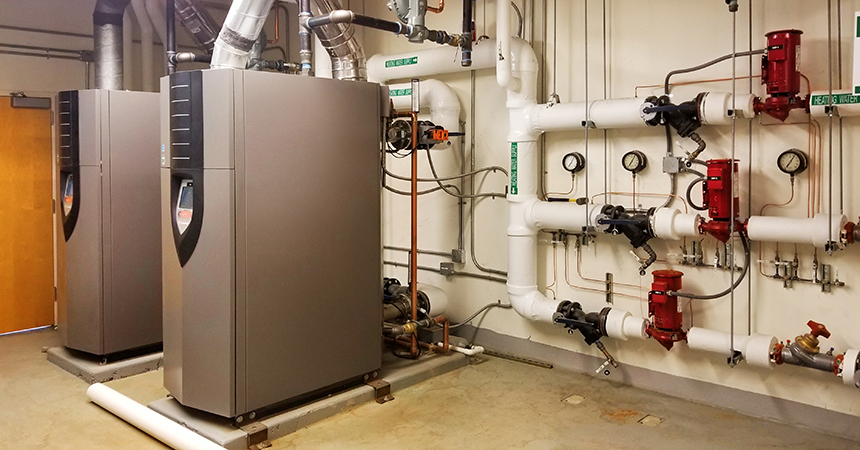
The new boilers require far less maintenance and operate with greater efficiency, saving the university thousands of dollars in utility costs annually.
The Washington State University (WSU), Vancouver, campus is located on 350 acres about 15 miles north of Portland. Centralized chillers circulate cooling water to all 12 campus buildings over a total of 500,000 square feet, but the campus has no centralized boilers. Instead, individual boilers operate in each building. After more than 25 years of operation, the original boilers and other mechanical systems reached the end of their useful life. “They needed consistent maintenance to keep running,” said Phil Oaks, director of facilities operations at WSU. “It was time to replace them.”
Since 2016, Oaks’ team has received $51,300 in cash incentives from Energy Trust of Oregon to help cover the cost of replacing boilers and water heaters located in their administration and science buildings. The new equipment requires far less maintenance and operates with greater efficiency, saving 14,900 therms and $11,800 in utility costs annually. “We can operate the new boilers at 5–10% power and still maintain the hot water loop,” Oaks said. “The old boilers ran at only two speeds: on and fully fired or off.”
The new boilers also connect with building automation systems, monitoring and adjusting the hot water loop as needed to maintain comfortable temperatures.
When installing the new boilers under COVID-19 restrictions in 2020, contractors kept their faces covered and took other precautions. Although the campus was closed because of the pandemic, researchers were working in the science building, so contractors had to leave at least one boiler on all the time. “We would relocate one and fire it up, move the other one over and get that up and running,” Oaks said. “Plus, all the hot water circulation pipes are plumbed together, which added a challenge in sequencing all the project phases.”
Oaks said the savings resulting from Energy Trust incentives have helped fund other upgrade projects at WSU, including an upcoming water heater replacement in a classroom building on campus.
Before working with Energy Trust, the Vancouver campus had struggled to fund upgrades. Oaks said the incentives make it easier to get upgrades approved. “Energy Trust provides cost estimates that we can incorporate into our budget,” he said. “It helps us plan for upgrades in advance.”
Oaks’ team has also received Energy Trust incentives to help cover most of the cost of Building Operator Certification® training, which trains operators on building technologies and strategies for maintaining equipment, increasing occupant comfort, improving energy efficiency and reducing energy costs in their buildings. Oaks said of one staff member who recently completed the course, “He’s much more fluent in mechanical systems and better understands how air flows through the buildings. This is particularly important under COVID-19 requirements for increased air circulation.”
“We wouldn’t be able to do much of this without Energy Trust support,” Oaks said. “I try to take advantage of all the organization has to offer.”
Find out more about equipment upgrade offers available for your building, visit www.energytrust.org/existingbuildings.
